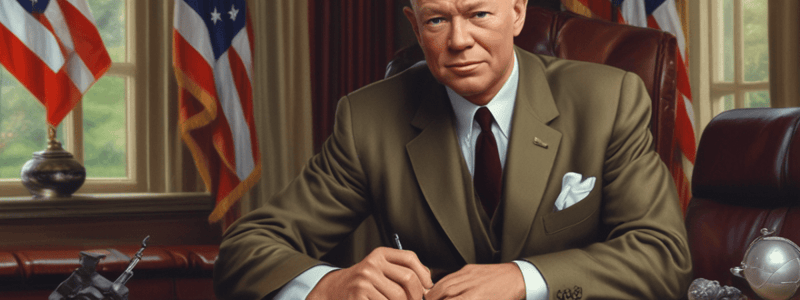Podcast
Questions and Answers
What was Eisenhower's approach to the Cold War?
What was Eisenhower's approach to the Cold War?
Maintained friendly social interactions with Soviet leaders while advocating for peace
What major infrastructure development project was initiated during Eisenhower's presidency?
What major infrastructure development project was initiated during Eisenhower's presidency?
Interstate Highway System
What conflict ended with an armistice, leaving the Korean Peninsula divided?
What conflict ended with an armistice, leaving the Korean Peninsula divided?
Korean War
What was Eisenhower's view on NATO and its importance?
What was Eisenhower's view on NATO and its importance?
What initiative did Eisenhower present to the UN General Assembly in 1953 regarding nuclear energy?
What initiative did Eisenhower present to the UN General Assembly in 1953 regarding nuclear energy?
Study Notes
Introduction
Dwight D. Eisenhower served as the 34th President of the United States from 1953 to 1961. During his tenure, he faced numerous challenges both domestically and internationally. However, his policies in areas such as the Cold War, the Interstate Highway System, the Korean War, NATO involvement, and the Atoms for Peace initiative profoundly shaped the course of American history.
Cold War Policies
Eisenhower's administration implemented a significant shift in US foreign policy with the introduction of the New Look strategy. This strategy aimed to maintain a large stockpile of nuclear weapons as a deterrent against potential Soviet aggression. The US nuclear arsenal grew from 1,005 to over 20,000 weapons during his presidency. Despite the increase in nuclear weapons, the US government sought to discourage the adoption of a similar nuclear doctrine by countries like India and Pakistan.
Interstate Highway System
The Interstate Highway System was another major initiative during Eisenhower's presidency. He believed that the system would facilitate economic development and military mobilization across the country. The Federal Aid Highway Act of 1956 authorized the construction of 41,000 miles of highways and the improvement of another 10,000 miles. This system remains a critical part of America's infrastructure today.
Korean War
The Korean War, which lasted from 1950 to 1953, saw the US adopt a hard-line stance against North Korea and China. Eisenhower made demands for elections in Eastern Europe and the unification of Germany. Despite his tough rhetoric, he maintained friendly social interactions with Soviet leaders, hoping to establish peaceful relations. The war ended with an armistice rather than a peace treaty, leaving the Korean Peninsula divided along the Demilitarized Zone.
NATO Involvement
During his presidency, Eisenhower continued the US commitment to NATO. His administration viewed NATO as a crucial defense alliance against the perceived threat posed by the Soviet Union. Eisenhower sought to maintain goodwill among NATO allies while advocating for measures to deter potential aggression.
Atoms for Peace Initiative
In 1953, Eisenhower presented his Atoms for Peace initiative to the UN General Assembly. He emphasized the potential benefits of nuclear energy for peaceful purposes, urging countries to redirect their research away from military applications towards civilian uses. The initiative led to the establishment of the International Atomic Energy Agency (IAEA) in 1957, marking a significant milestone in international cooperation over nuclear technology. While the Atoms for Peace campaign did contribute to the global spread of scientific and industrial nuclear technology, it also laid the groundwork for key elements of today's nuclear nonproliferation regime.
Legacy
Despite the various challenges faced during his presidency, Eisenhower's policies significantly shaped American foreign and domestic policy. His approach to the Cold War, infrastructure development, handling of conflicts like the Korean War, engagement with NATO, and promotion of peaceful uses of atomic energy left a lasting impact on the country's trajectory.
Studying That Suits You
Use AI to generate personalized quizzes and flashcards to suit your learning preferences.
Description
Test your knowledge on Dwight D. Eisenhower's presidency, covering topics such as Cold War policies, the Interstate Highway System, the Korean War, NATO involvement, the Atoms for Peace initiative, and his overall legacy.




